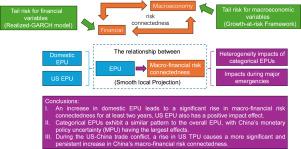国内和美国经济政策的不确定性是否会增加中国宏观金融风险的连通性?
IF 6.9
2区 经济学
Q1 BUSINESS, FINANCE
Research in International Business and Finance
Pub Date : 2025-08-01
DOI:10.1016/j.ribaf.2025.103138
引用次数: 0
摘要
虽然经济政策不确定性(EPU)已被证明会增加金融机构内部的系统性风险,但关于EPU在影响金融市场和宏观经济部门之间的风险连通性(溢出)方面的作用的认识有限。本文系统地分析和比较了中国宏观金融风险连通性如何应对国内和美国EPU的增加。结果表明:(1)国内EPU的增加导致宏观金融总风险连通性至少在2年内显著上升;具体而言,国内EPU的增加使金融市场更多地充当风险的传递者,而宏观经济部门更多地充当风险的接收者;(3)分类EPU表现出与整体EPU相似的模式,其中中国货币政策不确定性(MPU)的影响最大;(四)美元货币对中国宏观金融风险关联度的影响程度较低,持续时间较短;(5)然而,在中美贸易冲突期间,美国TPU的上升导致中国宏观金融风险连通性的增加更为显著和持续。本文章由计算机程序翻译,如有差异,请以英文原文为准。

Do domestic and US economic policy uncertainty increase China’s macro-financial risk connectedness?
While economic policy uncertainty (EPU) has been shown to increase systemic risk within financial institutions, there is limited knowledge about the role of EPU in influencing the risk connectedness (spillover) between financial markets and macroeconomic sectors. This paper provides a systematic analysis and comparison of how China’s macro-financial risk connectedness in responds to an increase in domestic and US EPU. The results suggest that: (i) an increase in domestic EPU leads to a significant rise in macro-financial total risk connectedness for at least two years; (ii) specifically, the increase in domestic EPU causes financial markets to act more as transmitters of risk, while macroeconomic sectors act more as receivers of risk; (iii) categorical EPUs exhibit a similar pattern to the overall EPU, with China’s monetary policy uncertainty (MPU) having the largest effects; (iv) US EPU also increases China’s macro-financial risk connectedness, though the impact is lower in magnitude and shorter in duration; (v) however, during the US–China trade conflict, a rise in US TPU causes a more significant and persistent increase in China’s macro-financial risk connectedness.
求助全文
通过发布文献求助,成功后即可免费获取论文全文。
去求助
来源期刊

Research in International Business and Finance
BUSINESS, FINANCE-
CiteScore
11.20
自引率
9.20%
发文量
240
期刊介绍:
Research in International Business and Finance (RIBAF) seeks to consolidate its position as a premier scholarly vehicle of academic finance. The Journal publishes high quality, insightful, well-written papers that explore current and new issues in international finance. Papers that foster dialogue, innovation, and intellectual risk-taking in financial studies; as well as shed light on the interaction between finance and broader societal concerns are particularly appreciated. The Journal welcomes submissions that seek to expand the boundaries of academic finance and otherwise challenge the discipline. Papers studying finance using a variety of methodologies; as well as interdisciplinary studies will be considered for publication. Papers that examine topical issues using extensive international data sets are welcome. Single-country studies can also be considered for publication provided that they develop novel methodological and theoretical approaches or fall within the Journal''s priority themes. It is especially important that single-country studies communicate to the reader why the particular chosen country is especially relevant to the issue being investigated. [...] The scope of topics that are most interesting to RIBAF readers include the following: -Financial markets and institutions -Financial practices and sustainability -The impact of national culture on finance -The impact of formal and informal institutions on finance -Privatizations, public financing, and nonprofit issues in finance -Interdisciplinary financial studies -Finance and international development -International financial crises and regulation -Financialization studies -International financial integration and architecture -Behavioral aspects in finance -Consumer finance -Methodologies and conceptualization issues related to finance
 求助内容:
求助内容: 应助结果提醒方式:
应助结果提醒方式:


